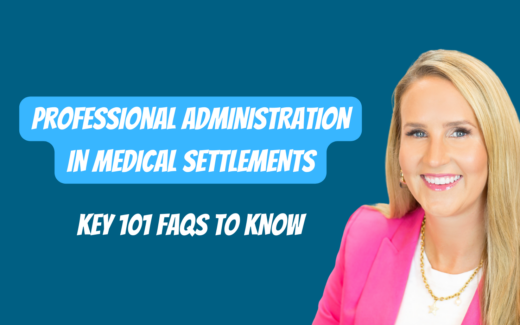Settlement of a workers’ compensation or liability claim can and should be a win-win for both the injured individual and the payer. However, various obstacles, along with confusion about the many nuances of both systems and how to manage medical funds post-settlement, may impede or even prevent medical case closure.
This three-part article series addresses common questions about medical settlements, including Medicare Set-Asides and how Professional Administration can be a game changer. This initial article will explore common inquiries that an injured individual getting ready for a medical settlement might have, covering topics such as the significance of a Medicare Set Aside and the resources required for transitioning their case after settlement.
What is Workers’ Compensation?
Workers’ compensation is a no-fault benefit system that covers employees who are injured at work. It works to the advantage of both the employer and employee:
- The employee’s medical bills and, in some cases, wages for missed work are covered
- The employer is protected from potential lawsuits by the employee
The reality of the workers’ compensation system can be more complicated than it may appear. For example, medical treatment may be denied in some cases, and the employer may dictate specific medical providers.
For those and other reasons, injured individuals may be anxious to escape the workers’ compensation system by settling their medical case. Settlements can be advantageous to both the worker and employee, as the worker receives an agreed-upon amount of money to cover their injury-related medical expenses, while the employer/payer gets the case off its books.
However, many injured individuals are extremely reluctant to settle their medical case and remain in the workers’ compensation system for years or even decades.
Why do Injured Individuals Have Concerns About Settling Their Future Medical?
Understanding the barriers to settlement is crucial for effectively navigating workers' compensation cases. Injured workers face significant hurdles, including the life-altering nature of their injuries and the anxiety surrounding settlement discussions.
When considering settlement, workers grapple with various fear-based concerns that act as barriers to closing the case and the decision to continue receiving care through the workers' compensation system including:
- Disagreement on the total value
- Advice from attorneys, family members, or friends not to settle
- Concerns they will run out of money
- Concerns about not having the resources they once had
- How to move forward with their lives
- Making misguided medical decisions
- Having to comply with Medicare billing and reporting requirements on their own
Fortunately, there are experts who devote their careers to understanding an allaying the concerns of injured individuals and help move their medical case to settlement.
What is Professional Administration?
Professional administration is a unique and often misunderstood concept. These third-party entities work solely on behalf of the injured individual. Once a case is settled, professional administrators serve a variety of administrative functions, such as:
- Act as the health care advocate for the injured individual
- Help locate and communicate with medical providers
- Set up an account in the injured individual’s name and help to manage and pay health care bills
- Review medical bills and provide discounts
- Handle any necessary reporting to Medicare
The goal of the professional administrator is to provide the injured individual the comfort and peace of mind to know they will be taken care of once their medical case has been settled.
The most proficient professional administrators enter the process long before the settlement occurs. Being proactive is key.
A first order of business is to work with the injured individual and their family to address each and every concern they have about settling the claim.
- Do they have family needs that may require a special needs trust?
- Are they trying to start a business?
- Is there a spouse with specific goals or desires?
- Are they trying to put their kids through college?
- What elements have significant importance in their life?
For the many injured individuals who are, or soon will be, eligible for Medicare benefits, the situation becomes extremely tricky. The settlement must be designed and managed diligently to protect the injured individual.
What is a Medicare Set Aside?
The Centers for Medicare and Medicaid Services (CMS) requires all Medicare beneficiaries to protect Medicare’s interest on all workers’ compensation claims and ensure Medicare is secondary.
Under federal law, Medicare is precluded from paying a beneficiary’s medical expenses when paid or can reasonably be expected to be paid under a workers’ compensation policy. The recommended method to ensure Medicare’s interests are protected is a Workers’ Compensation Medicare Set Aside (WCMSA.)
The adjuster is required to take Medicare’s interest into account every time a workers’ compensation case is settled. However, as a practical matter on lower dollar claims, the adjuster accomplishes this by paying the estimated future medical costs in the settlement.
High-dollar claims present more of a challenge. CMS interests must be protected if:
- the employee is a Medicare beneficiary at the time of settlement, and the total settlement is over $25,000 or,
- the employee has a reasonable expectation of Medicare enrollment within 30 months of the settlement and the total settlement is greater than $250,000 or,
- the employee has applied (even if not yet accepted) for Social Security Disability benefits
Complying with Medicare’s rules is vital to ensuring that the injured individual does not lose benefits in the future.
If the MSA funds exhaust at any point, Medicare will step in as the primary payor – if the injured individual strictly complies with the Medicare rules and regulations.
Are there Resources to Help Manage the Settlement Funds and Medicare Set Aside?
Managing settlement funds to be budgeted and properly allocated for medical treatments over a lifetime is no easy task. In addition, navigating the myriad of rules and regulations essential for the proper management of Medicare Set Aside accounts can overwhelm even the most savvy individuals.
The issue is so complex that even Medicare itself advises injured individuals to have an expert manage this aspect of a settlement rather than trying to self-administer it. Without professional support, there are limited resources available to help an injured individual understand how to properly manage their medical settlement funds. These resources include the Workers’ Compensation Medicare Set Aside (WCMSA Reference Guide) v4.0 released April 2024 and the 31-page Self-Administration Toolkit for Workers’ Compensation Medicare Set-Aside Arrangements version 1.4. A professional Administrator can simplify the administrative process of managing medical settlement funds so the injured individual can focus on their care and recovery. Professional administrators ensure the MSA is designed and properly managed, providing peace of mind to the injured individual.
Why is Professional Administration Recommended for Medicare Set Asides?
The Simple Answer: The Centers for Medicare & Medicaid (CMS) highly recommends including professional administration in the case of an MSA. Professional Administration can help take the burden off the injured party when it comes to reporting to CMS, tracking funds, and managing funds.
The Centers for Medicare and Medicaid (CMS) updated their Workers’ Compensation Medicare Set-Aside (WCMSA) Reference guide in July of 2017 to include professional administration in Section 17.1.
It states, “It is highly recommended that settlement recipients consider the use of a professional administrator for their funds.
MSA professional administration is recommended because, as stated above, there are many rules and regulations that go into administering an MSA account, and it is very easy for an injured individual to risk their Medicare benefits by mismanaging their account.
By using professional administration, injured individuals can ensure their settlement funds are preserved and appropriately managed, thereby securing their healthcare needs without the burden of direct management and potential pitfalls.
This arrangement not only safeguards their future injury-related Medicare benefits but also provides significant peace of mind by having a healthcare advocate on their side. The professional administrator will efficiently manage and pay bills at discounted rates, ensure compliance with Medicare reporting requirements, and give the injured individual the autonomy to seek treatment on their terms and timeline.
Part two of this article series on medical settlements and Professional Administration will delve into the critical responsibilities that injured individuals need to grasp before finalizing their future medical funds settlement. It will shed light on the potential risks linked to mismanaging medical funds and highlight the importance of leveraging professional administration from the outset to mitigate these risks effectively.
Stay tuned to learn more about:
- The injured individuals' obligations
- The risks of failing to adhere to the rules and regulations
- Ways the professional administrator can smooth out the process of settling medical cases
For any questions about professionally administering a medical settlement, please feel free to contact us.



